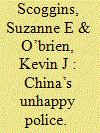| Srl | Item |
| 1 |
ID:
144749


|
|
|
|
|
| Summary/Abstract |
Facing heavy caseloads, administrative drudgery, and low pay, China’s street-level police are frustrated. Front-line officers from six cities report that discontent encourages shirking, corruption, and waste. Grievances and feelings of powerlessness have not been reduced by recent reforms, and give us cause to rethink the image of police as effective arms of a highly securitized state.
|
|
|
|
|
|
|
|
|
|
|
|
|
|
|
|
| 2 |
ID:
188516


|
|
|
|
|
| Summary/Abstract |
Street-level bureaucrats in the field of migration control express ideas of who should have the right to stay (or not), influenced by individual stereotypes, but also by organisational structures and established legal provisions. Tasked with screening for ‘bogus’ asylum seekers and deporting irregularised migrants, they are asked to categorise and sort these people according to certain guidelines and policies. It is argued that within migration enforcement, there are two interlinked and underlying rationales which allow for and facilitate such categorisations: suspicion and notions of (un)deservingness. The article presents ethnographic data collected in migration enforcement agencies in Sweden, Switzerland, Lithuania and Latvia in order to cross-examine both concepts. It captures how suspicion becomes a default mode of migration enforcement and allows exclusionary deservingness categories to be created, which again feed back into daily practices to detect suspicious individuals. This intertwined relationship can uphold and normalise a discriminating system despite discrepancies that come up in the creation of these categories.
|
|
|
|
|
|
|
|
|
|
|
|
|
|
|
|
| 3 |
ID:
174581


|
|
|
|
|
| Summary/Abstract |
Schools, as public institutions cope with the challenge of immigrant absorption. Lipsky’s theory of street-level bureaucrats argues that civil servants at the end of the hierarchy are the most significant in implementing policy. This article examined the conditions that lead teachers to become street-level bureaucrats and cultural mediators, and how they influence student immigration policy. The qualitative study included interviews with 25 teachers of immigrants and found four conditions under which teachers positively influence policy on the ground. As they play significant roles in immigrants’ lives, investment in appropriate training for teachers of immigrants is recommended.
|
|
|
|
|
|
|
|
|
|
|
|
|
|
|
|